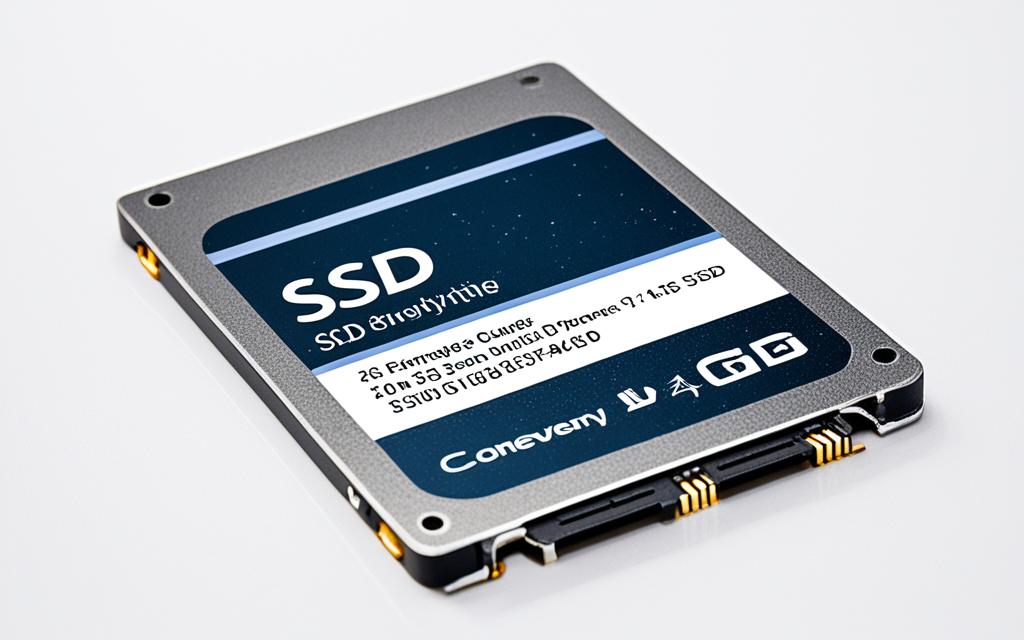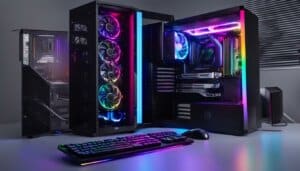Table of Contents
When thinking about storage, people often wonder if a 512GB SSD is enough. It can provide around 476GB of real space on Windows after taking into account the difference between how computers and people measure space1. This size usually fits daily needs like work and leisure well. Yet, for those into video editing or gaming, it’s crucial to plan how to use this space. Especially since games now need much more room, usually between 50GB and 100GB1.
Even though a 512GB SSD can hold many applications, heavy usage might need extra storage plans. As tech gets better, knowing how much storage you need is key.
Key Takeaways
- A 512GB SSD offers approximately 476GB usable space on Windows PCs.
- It can store 8 to 10 video games, 128,000 pictures, or 4,000 high-definition videos, demonstrating its versatility.
- Modern gaming titles often exceed 50GB, highlighting potential storage challenges.
- For users with demanding storage needs, exploring larger SSD options may be necessary.
- Upgrades to 1TB or higher SSDs can effectively address limited storage capacity.
- The lifespan of a 512GB SSD averages between 5 to 10 years.
Understanding SSD Storage Capacities
The debate of SSD vs HDD often focuses on performance and everyday use. SSDs use flash memory, giving them a speed and durability edge over HDDs. HDDs use spinning disks and can’t match SSDs in read and write speeds. This makes SSDs better for a smooth digital storage experience.
The Difference Between SSDs and HDDs
SSDs have clear benefits over HDDs. They boot up in seconds, unlike HDDs that take much longer. This speed is great for those who value quick access and efficiency. SSDs also have no moving parts, making them more reliable, especially in laptops. Lenovo’s high sales of 512 GB SSD laptops each year reflect the demand for speedy and reliable storage options2.
How Digital Storage Is Measured
It’s vital to understand SSD storage capacity. Storage is often marketed in gigabytes (GB), but systems like Windows use gibibytes (GiB). This means a 512GB SSD actually has about 476GB of real space. The difference in measurement methods shows why knowing digital storage terms is key. As apps need more space, thinking about future storage alongside current needs is important.
| Storage Type | Average Price | Usable Capacity |
|---|---|---|
| 512GB SSD | $30 – $150 | Approx. 476GB |
| 1TB SSD | $60 – $300 | Approx. 931GB |
Grasping these points aids in making smart choices between SSD and HDD. Upgrading to a 1TB SSD not only gives more room for files but is usually more cost-effective when considering price per GB3.
Is 512GB SSD Enough for Average Users?
In today’s fast-changing digital world, many wonder if a 512GB SSD is enough. It’s crucial for everyday users to evaluate their storage needs carefully.
Storage Needs for Everyday Tasks
If you’re mainly doing office work or enjoying light multimedia, 512GB SSD is likely enough. Systems like macOS and Windows need about 20-25GB for basic setup. This leaves roughly 456GB free4. That space is enough for your documents, tunes, and some photos and videos. With this setup, managing your daily storage should be stress-free.
Office Work vs. Entertainment
The needs for storage can change a lot between work and play. Work documents take up much less space than streaming HD videos or gaming. Media files, especially, can eat up a lot of space, calling for good planning5. High-quality games and videos are getting bigger. If these are your main activities, you might need more storage like an external hard drive or cloud services to pair with your 512GB SSD4.
Assessing Gaming Requirements with a 512GB SSD
For gamers, knowing how much storage you need is key. Average modern game size can be big, so picking the right SSD, like one with 512GB, is important for good game play. Some of the top games need a lot of space, from 30GB to more than 100GB. For instance, Grand Theft Auto V needs about 75GB, and new games like ‘Tekken 8’ may need even more. This is a tough call for anyone with a 512GB SSD6
The Average Size of Modern Games
As games get bigger, filling up a 512GB SSD happens fast. Most gamers think 1TB is enough to have up to ten games. But even a game like ‘Skull and Bones’ asks for 65GB. This shows why bigger SSDs are worth thinking about, even if they cost more7.
Optimising Gaming Performance with SSDs
Even with space issues, SSDs make games run better. They cut down on load times and make systems more responsive. This is key for smooth gaming. Gamers might clean up old games or use extra storage to keep up. As games need more space, being smart with storage matters6.
Having an SSD with 1TB or more is a smart move for the future. It helps keep up with growing game sizes7.
Is 512 GB SSD Enough for Professional Use?
For professionals in video editing and content creation, a 512GB SSD may not be enough. The need for space can skyrocket due to large video and project files. Many find they need more Terabytes to keep up with their professional storage needs.
SSDs are great for fast access to big media files. But, relying only on a 512GB SSD could slow down your work when it gets really busy.
Storage Demands for Video Editing and Content Creation
The needs for video editing and making content can outgrow a 512GB SSD. When projects get big, storing all those video clips and edits is tough. For those deeply into these creative areas, adding external storage solutions is key.
It helps keep enough room for all your work. And it ensures SSD’s fast performance for the files you’re currently using.
The Importance of External Storage Solutions
External storage, like hard drives and cloud services, is crucial for large media and project files. A 512GB SSD is good for current projects but not for everything. Using more storage lets professionals move out older or less used files.
This approach keeps your SSD quick. Also, it helps with the growing demands of professional storage needs. It ensures creatives can manage their workload, no matter how much it grows.
Common Alternatives and Upgrades
If you often run out of space on a 512GB SSD, looking into alternatives can greatly improve your computer use. When thinking about SSD upgrades, it’s important to consider the benefits of moving to larger SSDs. You can choose from sizes ranging from 1TB to over 4TB. This gives you plenty of space for programs and files without slowing down your computer. Such an upgrade can greatly reduce the stress of not having enough storage, a common issue for keen users or professionals.
When to Consider Larger SSDs
Thinking about a bigger SSD is wise when your current storage is always full. Every computer task needs enough space; heavy software, games, or many programs can fill up your storage fast. Recent studies show that SSD upgrades not only give you more space but also make your computer run better, improving your experience. For example, Kingston Technology now sells SSDs up to 4TB, showing there’s a big market for those wanting more storage8.
Benefits of Cloud and External Storage Options
Besides bigger SSDs, looking at cloud storage and external hard drives is smart for handling data. Cloud storage lets you get to your data from anywhere and keeps it safe with regular backups. External drives are good for storing files you don’t use every day. This lets your SSD focus on main programs, which makes it run better. Using both cloud and external storage can help you manage your files well while keeping your computer quick.
| Storage Option | Capacity Range | Access Speed | Flexibility |
|---|---|---|---|
| Larger SSDs | 1TB – 4TB | Fast (up to 7400 MBps) | Fixed in-system |
| Cloud Storage | Varies | Dependent on internet speed | Accessible anywhere |
| External Hard Drives | Up to 20TB (and more) | Moderate (varies by drive type) | Portable |
These options help users meet their storage needs while keeping their systems running well. Always check your specific needs and watch how you use your computer to choose what’s best for you. Moving to bigger SSDs and using cloud storage can boost performance and solve storage problems8.
Conclusion
Whether a 512GB SSD is enough depends on how you use it. For everyday tasks like surfing the web and making documents, it’s usually fine for most people9. But, if you’re into video editing, you might need more space for your big files10. Gamers should also think about game sizes, which can be between 40-70GB. This means they may need extra storage for several games10.
As digital content grows, it’s important to check if a 512GB SSD fits your needs. People are getting creative, using cloud services and external hard drives for more space9. It’s all about staying ahead and ready for how our storage needs change. Make sure to think about your own needs and how storage trends might affect you in the future.
FAQ
Is a 512GB SSD sufficient for everyday use?
A 512GB SSD can handle everyday tasks well. It’s good for office jobs, surfing the web, and some gaming. After the system takes its share, you’re left with around 476GB. This is plenty for lots of documents, songs, and quite a few pictures and videos.
How much space do modern games typically require?
Today’s games need a lot of space, from 30GB to more than 100GB. Games like ‘Skull and Bones’ need about 65GB. ‘Tekken 8’ might need more than 100GB. So, a 512GB SSD can get full quickly with a few modern games.
What are the key differences between SSDs and HDDs?
SSDs are quicker because they use flash memory to store data. HDDs use spinning disks, making them slower. SSDs make a big difference in speed for games and demanding apps.
Does a 512GB SSD support professional content creation?
For video editing and content making, a 512GB SSD may fall short. High-quality videos and big projects take up lots of space. Creators might need storage in the terabytes to keep up, although SSD speeds are a plus.
How should users manage their storage on a 512GB SSD?
Keep an eye on how much space you’re using. Delete games or apps you’re done with. You can also use cloud services or external drives. This helps keep your SSD from getting too full.
When should I consider upgrading from a 512GB SSD?
If you’re always running out of space or if you need to store big files and games, get a bigger SSD. Options range from 1TB to 4TB. This will help your system stay fast and reliable.
How is digital storage measured on devices?
Storage is usually in GB. But, Windows uses GiB which means a 512GB SSD shows about 476GB free. This is after setup and the operating system are installed.
Source Links
- https://www.minitool.com/partition-disk/is-512gb-ssd-enough.html – Is 512GB Enough? If Not, Upgrade to a Larger SSD Manually
- https://www.lenovo.com/us/en/d/512-gb-ssd-laptops/ – Shop Our Best 512 SSD Laptops Today
- https://www.tobiasholm.com/tech/512gb-ssd-vs-1tb-ssd – 512GB SSD vs 1TB SSD – Which Is Best for You?
- https://www.gearpatrol.com/tech/a719946/how-much-laptop-storage-do-you-need/ – How Much Laptop Storage Do You Really Need? | Gear Patrol
- https://www.partitionwizard.com/partitionmagic/how-much-ssd-do-i-need-007.html – How Much SSD Storage Do I Need? Answer Here! – MiniTool Partition Wizard
- https://www.elinfor.com/knowledge/is-1tb-ssd-enough-for-gaming-how-to-choose-capacity-of-ssd-p-11233 – Is 1tb SSD enough for gaming? how to choose capacity of SSD?
- https://medium.com/@spingaming2022/how-to-get-more-storage-on-gaming-pc-74b777afad66 – How To Get More Storage On Gaming Pc
- https://www.kingston.com/en/blog/pc-performance/memory-vs-storage-pc-performance – Memory vs Storage: PC Performance
- https://apphut.io/blog/is-512-gb-enough/ – Unveiling the Depths of Storage: Is 512GB SSD Enough for Modern Device
- https://inpics.net/is-512gb-ssd-enough-for-gaming-on-laptops-and-desktops/ – Is 512GB SSD Enough for Gaming on Laptops and Desktops? – InPics Solutions









